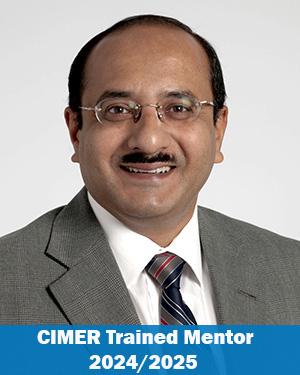Research News
03/03/2022
Cleveland Clinic Researchers Receive Two Grants to Study Pathogenesis of Multiple Sclerosis
Dr. Dutta is collaborating with other Cleveland Clinic researchers to explore possible novel causes of disease progression in multiple sclerosis, as well as potential therapeutic targets.

Ranjan Dutta, PhD, assistant staff in the Department of Neurosciences, has received two grants totaling nearly $2.8 million from the National Institute of Neurological Disorders & Stroke to collaborate with other Cleveland Clinic researchers to investigate potential causes of multiple sclerosis (MS), an autoimmune disease that affects the central nervous system (brain and spinal cord).
MS is characterized by demyelination, or damage to the protective covering that surrounds nerve cells (myelin sheath), and degeneration of both gray and white matter in the brain. As a result, individuals with MS can experience a wide range of symptoms, including vision loss, pain, fatigue and impaired coordination.
“Currently, there is no cure for progressive MS, so it is critical that we continue to pursue comprehensive understanding of the mechanisms that drive MS progression in order to develop novel therapies,” said Dr. Dutta.
Investigating a link between circadian disruption and remyelination
With the first grant ($2.3 million over five years), Dr. Dutta and Sujata Rao, PhD, associate staff in the Department of Ophthalmic Research, will investigate a potential link between the circadian cycle, or the internal process that regulates the sleep–wake cycle, and remyelination.
Circadian and/or sleep disruptions are common in MS patients, but their roles in affecting the process of myelin repair in the context of MS are unknown.
“Intriguingly, oligodendrocyte progenitor cells (OPCs), which form oligodendrocytes for production and maintenance of myelin, are present in regions of demyelination, but fail to perform their function in repairing the damage,” noted Dr. Dutta. “Our initial data has led us to believe that oligodendrocyte-specific circadian disruption could inhibit remyelination, so we have teamed up with Dr. Rao, who is an expert in the field of circadian research and the cell-specific alteration of circadian disruption.”
Utilizing samples from MS patients with sleep disruption, MS autopsy tissues, and animal models with cell-specific deletion and overexpression of key circadian genes, the researchers will explore whether circadian disruption can lead to remyelination failure in MS.
“Using animal models with OPC-specific deletion of circadian pattern regulators, we could easily identify the role of circadian disruption in myelin repair,” said Dr. Rao. “Outcomes of the project will be helpful in guiding the development of drugs directed towards resetting the circadian rhythm to improve clinical outcome for MS patients.”
The study also will use well-characterized human MS brain tissues from the Cleveland Clinic MS brain donation program, a collaboration among the Mellen Center for Multiple Sclerosis Treatment and Research, the Pathology & Laboratory Medicine Institute, and the Departments of Biomedical Engineering and Neurosciences. This program, among the very few in the world, is maintained by Dr. Dutta and Bruce Trapp, PhD, chair of the Department of Neurosciences.
Exploring the role of thalamic atrophy in MS
With the second grant ($444,000 over two years), Dr. Dutta and Kedar Mahajan, MD, PhD, a neurologist in the Mellen Center for Multiple Sclerosis Treatment and Research, will explore the molecular basis of thalamic volume loss, or atrophy, in MS.
Deep gray-matter structures in the brain, such as the thalamus (an organ within the brain that helps transmit motor signals), have received significant attention in MS research due to their early volume loss. While thalamic atrophy is a predictor of disability and cognitive impairment in MS, the exact mechanisms underlying thalamic degeneration are not well characterized.
Dr. Mahajan’s previous work identified non-thalamic demyelination as a major determinant of regional atrophy and found that specific regions were more correlated with clinical disability. In this study, the researchers will use human MS brain samples collected through the Cleveland Clinic MS brain donation program and modern analytical tools to identify and validate patterns of thalamic sub-regional volume loss in MS. They will then integrate the data with thalamic imaging measures and neurological outcomes from Dr. Mahajan’s clinical practice to enable a comprehensive understanding of thalamic changes.
“When it is completed, this study will provide a significant step forward toward understanding how neuronal loss occurs in the brains of MS patients and will provide an effective tool for monitoring and eventually preventing neurodegeneration in MS patients,” said Dr. Dutta.
Featured Experts
News Category
Related News
Research areas
Want To Support Ground-Breaking Research at Cleveland Clinic?
Discover how you can help Cleveland Clinic save lives and continue to lead the transformation of healthcare.
Give to Cleveland Clinic